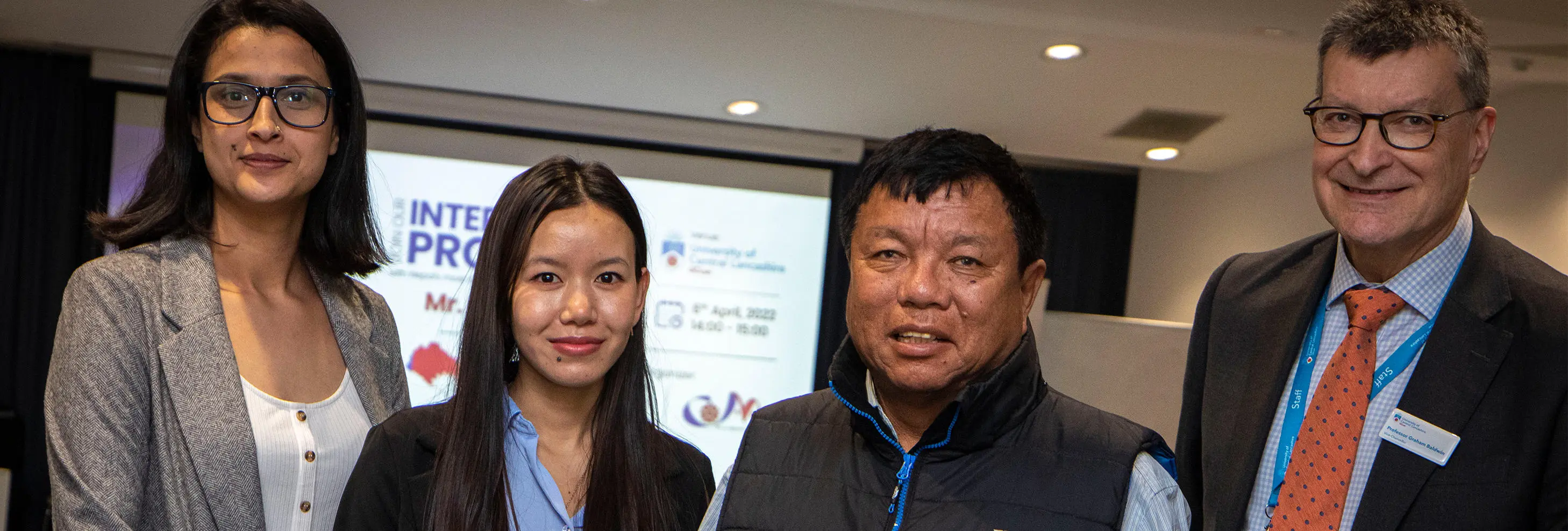Dr Mahabir Pun Magar spoke to students and staff at the Preston Campus
A well-respected Nepali scientist and activist has been honoured for his contribution to the field of research and technology by the University of Central Lancashire (UCLan).
Teacher and Founder of Nepal’s National Innovation Center, Dr Mahabir Pun Magar was invited to talk about his fascinating career, including his extensive work in applying wireless technologies to develop remote areas of the Himalayas, at the University’s Preston Campus.
As part of the visit, the social entrepreneur met with students from his homeland and members of the University’s International Team. In addition, he was given a guided tour around UCLan’s Engineering Innovation Centre and he spoke to a variety of academics from the Schools of Business, Engineering and Medicine. After his talk he was treated to a performance by a group of traditional Nepali dancers.
Dr Pun said: “I was very happy to be invited to UCLan to speak about the many projects I’m working on in Nepal and it was such a pleasure to meet and speak to many Nepali students.
"I was very happy to be invited to UCLan to speak about the many projects I’m working on in Nepal and it was such a pleasure to meet and speak to many Nepali students"
— Dr Mahabir Pun Magar, Founder of Nepal’s National Innovation Center
“Collaboration is so important for the development of Nepal. The Innovation Center we have in Nepal is small, we only started three-and-a-half-years-ago, whereas UCLan is a big University and there are so many innovative and expert people working here in the faculties. We can learn from UCLan and work with the Engineering Innovation Centre as that will help us to fulfil our dream to make Nepal a prosperous country.”
He is a widely known figure in Nepal, and his work has been recognized by the Ashoka Foundation, the Ramon Magsaysay Foundation, University of Nebraska, and Global Ideas Bank.
He gave up a potentially lucrative dot com career in the United States of America to return home in 1997 with the aim of doing something about helping the poor access computers and technology.
Dr Pun started out with four computers at a school in his village of Nangi and set up a wireless antenna on top of a tree to connect him to a server in Pokhara and connect his school to the internet.
In 2001, with help from overseas volunteers, he rigged a wireless connection between Nangi and the neighbouring village of Ramche using TV dish antennas.
"We are privileged to be part of a University community that has a strong international dimension and benefits from the enhanced educational experiences these many cultures bring"
— Professor Graham Baldwin, UCLan Vice-Chancellor
The project developed via his Nepal Wireless Project and the model of simple, effective, and successful rural internet access is now used for education and to exchange information about locally produced goods and commodity prices, village activities, and weekly markets. The wireless network also provides telemedicine facilities to eight villages with doctors from a Pokhara hospital.
The humanitarian, whose work is inspiring many youths to return their own country and serve it for its development, founded the non-profit organization National Innovation Center in 2012 with the aim of exploring and discovering the country's development potential through information and technology.
Speaking at the event, UCLan Vice-Chancellor Professor Graham Baldwin said: “I am delighted to welcome such a well-respected speaker from Nepal to share some of the interesting work he does to help his country overcome challenges.
“We are privileged to be part of a University community that has a strong international dimension and benefits from the enhanced educational experiences these many cultures bring.”
Photo caption: From (L-R) UCLan intercultural business communication student Projina Sapkota, UCLan business management student Anisha Limbu, Nepali scientist Dr Mahabir Pun and UCLan Vice-Chancellor Professor Graham Baldwin.

